2007 European Brass Band Championships - Cory's 1980 triumph
30-Apr-2007It is now 27 years since Cory won their only European title to date. Some of the 1980 stalwarts remember just how they did it.
This year sees the return of one of the most famous names in banding to the European Brass Band contest. The name though, not the band.
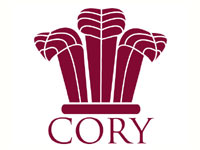 The Cory Band will take to the stage at Symphony Hall on the weekend determined to try and win the European title for the second time in its history – and for the first time in 27 years.
The Cory Band will take to the stage at Symphony Hall on the weekend determined to try and win the European title for the second time in its history – and for the first time in 27 years.
They have of course come close before – three runners up spots in the last few years, but for those with a love of history and a belief that bands never lose their original identity despite a change in name, the news that the band had returned to its most famous moniker could see the local jeweller in Ton Pentre engraving their name on the famous Milton Stevens trophy. History does have the occasional habit of repeating itself.
The only time the trophy has crossed Offa's Dyke into the Principality of Wales occurred in 1980 when Cory directed by Denzil Stephens went to the Royal Albert Hall for the Nationals weekend on the 4th & 5th of October. It wasn't the iconic 'treble clef' trophy however, as Cory were the last band to win the origianl European Cup presented by Boosey & Hawkes.
In the first five years of the event, the European contest took place on the same weekend as the National Finals and meant that for the British bands in particular who had qualified, they had to prepare three major test pieces to be played on two days.
Cory had qualified for the European contest by virtue of becoming Champion Band of Wales the previous year – a process that saw them win all six contests that made up the championship in 1979, the first time it had been done and which culminated in a five point clear victory at the Pontypridd contest in the December.
The National qualification was a different story all together as Cory rather upset many in the Principality by accepting an invitation to compete at the 1980 Nationals even though the Welsh were in dispute with the National organisers. They won the Welsh Region of Brass Bands Contest held in Treorchy in the March by a massive six point margin playing ‘Beatrice & Benedict' (the same as the regional test piece that year), but then headed for London even though no other South Wales band in any section made the trip.
The Cory Band at the time had gone through a period of some rebuilding but under Denzil Stephens who had taken over the baton from the charismatic Major Arthur Kenney things took a progressive turn for the better. He had come to the band after resigning his commission with the RAF in the January of 1978 and leaving Carlton Main Frickley after winning Granada Band of the Year.
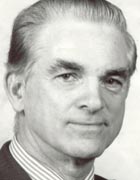 He recalled the immediate period of his appointment to 4BR: "The Cory Band had not won the Welsh Area contest for the past two years and were wanting to improve their lot, so I set about training the band hard, using the same 26 players and not replacing anyone. I built up a good team spirit during the Summer months and when the band won the Pontins Championships later that year I knew we were developing along the right lines."
He recalled the immediate period of his appointment to 4BR: "The Cory Band had not won the Welsh Area contest for the past two years and were wanting to improve their lot, so I set about training the band hard, using the same 26 players and not replacing anyone. I built up a good team spirit during the Summer months and when the band won the Pontins Championships later that year I knew we were developing along the right lines."
In fact the band went on to win 11 contests from 13 attempts under Denzil Stephens during that period. Graham Shepherd was the bands BB tuba player at the time and recalled that the bands success wasn't always appreciated by rivals. "We were sometimes called ‘pot hunters' by other bands we beat, but it didn't bother us. We were a close-knit bunch of lads and were not big headed in any way. We worked hard at our playing and there was a great atmosphere in the band. Rehearsals were hard but enjoyable and we knew we had to work our socks off to be beat the bands up north. There were no stars, just plenty of good honest blokes who enjoyed each others company and appreciated each others talents."
The Principal Cornet player with the band was certainly a star performer however and Jim Davies remembers the time well. "I came to the band in 1972 and over the years we had a fantastic camaraderie as well as excellent support from our Ladies Section who organised things and raised money for the band. Denzil Stephens came to the band and immediately made an impact. He was just what the band needed at the time, although he was a totally different conductor and band trainer to the ‘Major'."
The band had come second to Black Dyke at the 1979 European contest and Denzil Stephens recalls that even though they celebrated long into the night they had already resolved to work even harder for the following year. "We came 9 points behind Black Dyke that day and although the band celebrated together with their families well into the night singing songs and revealing that sense of belonging to a small community sometimes missing from many other top bands, they resolved to come back and win the contest the following year."
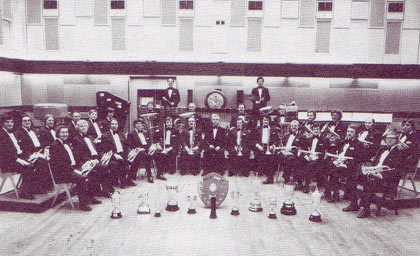
Close knit band: Cory circa 1980
The hard work started in earnest as Jim Davies recalls and the band felt thoroughly prepared for the contest come the October: "We had chosen ‘Triumphant Rhapsody' as our own choice selection and we enjoyed ‘Land of the Long White Cloud' which was the set work. We had to prepare ‘Carnival Overture' for the Nationals too, so there was plenty of hard preparation work and we used to rehearse three times a week."
"Much of the preparation was down to the players and we always tried to improve things amongst ourselves. We were a solid band, with no stars but plenty of great players who were just as solid and secure on stage as they were in the practice room. We didn't feel in awe of bands such as Black Dyke, but we certainly respected them and even when players from the top bands asked us how things were going we were honest and told it to them straight that some parts of the piece we found difficult – something they never used to admit too often!"
The final preparation for the weekend went well although disaster struck on the Friday night before the contest when the bands Bb tuba player Selwyn Lloyd suffered a heart attack. "That came as a shock to us all, said Graham Shepherd. "We had done a concert and that happened. Thankfully Selwyn made a full recovery, but that meant we had to get a player in for the European contest and we actually played with just three basses on the Saturday at the Nationals on ‘Carnival' and our baritone player had to play the cymbals."
Cory eventually came 6th off an early number 4 draw, but the disappointment of the result was soon put behind them as they prepared for the European the next day. "We had a rehearsal in the Irish Guards Barracks early in the morning whilst Black Dyke used the Welsh Guards Barracks over the road, " Jim Davies recalls. "We were happy with the way things went although if I remember Black Dyke had a missing player and they didn't look too happy at all."
The band had drafted in a replacement on Eb tuba too with Brian Davies stepping into the breach at short notice as he was studying at the time in London. "It all seemed to come together on the day," Graham Shepherd remembers. "Jim Davies was the key – what a player he was on stage. He organised everything in the band room and made sure nothing was left to chance. We had such confidence in him and his self confidence, never arrogance mind you, just flowed from him and to the rest of the band. He was brilliant on the day on both pieces, especially on the Vinter."
Jim Davies doesn't remember a great deal about the performance though. "We seemed happy enough I remember as we had drawn number 2 on the set work and then number 3 in the afternoon on the own choice. It was a long old day and Black Dyke had a great draw to finish off the contest as last band on with, ‘Journey Into Freedom'. We had done enough though to win it and that's all that mattered."
In fact Cory had taken an all important lead on the set work in the morning, coming out ahead of the Swiss representatives Brass Band Treize Etoiles by two points with Black Dyke a further point behind.
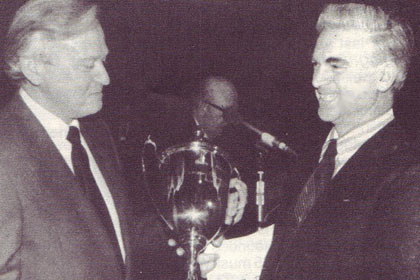
European Champions! Denzil Stephens picks up the European Cup
Come the afternoon and Black Dyke certainly turned up the heat winning the own choice section by three clear points from Cory in second to tie on points overall. Cory's win in the morning though meant that the title headed to South Wales. As one of the judges wrote at the time in his remarks on the set work "A quite brilliant performance taken at such a remarkable pace".
"We had a fantastic time celebrating," remembers Graham. "We had a few drinks after the result and then phoned up our local, the Ton Pentre Hotel to tell them that we would be back with the trophy as European Champions, and to wait open for us. When we got back we had a ‘lock in' until the very early hours of the morning, whilst we had fantastic coverage in the local press and support from the local authority to recognise the achievement."
That was the high water mark for the Cory Band under Denzil Stephens.
The following year they came 6th in defence of their title and the partnership ended in 1982 when Major Kenney returned to mastermind their famous hat trick of National wins.
However, Denzil Stephens remembers the period with fondness. "I was glad to achieve all the success with the band with the original players that were at the first rehearsal I attended and feel so sad that so many bands today have to spend so much money on importing players from other bands in order to compete."
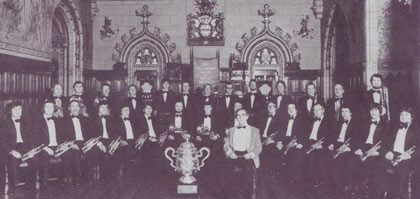
The aura of National Champions: Cory circa 1983 under Major Kenney
Graham Shepherd too remembers the MD fondly. "He was an excellent band trainer and always knew what he wanted us to do on stage. He was a military man all right but that was perhaps what we needed at the time to make the most of ourselves on the contest stage. The Cory Band has a great dealt to thank him for. There was an ‘aura' about the band that he started to develop that later flourished under Major Kenney."
And finally Jim Davies: "The European win was a great achievement for the band at the time. We certainly worked hard for it and the players deserved it I think. It was a highlight for me in my career, although I used to perhaps enjoy the contest more in Europe where the enthusiasm for the bands was greater. It's nice to say that we won it though."
The winning band on the day was as follows:
Principal Cornet: Jim Davies; Solo Cornets: John Neathy, Richard Dix, Paul Hedditch; Soprano: Gwyn Thomas; Flugel: Jeff Thomas; Repiano: Howard Jones; Back row cornets: Ian Jones, Deri Price, Ralph Morgan, Greg Jones; Horns: Wayne Cook, Robin Davies, Jeff Shepherd; Euphoniums: Roy Roberts, Huw Watkins; Baritones: Stuart Lewis, Phil Wicks: Trombones: Don Tanner, Terry Lambert, Gareth Keys: Tubas: Brian Davis, Huw Williams, Graham Shepherd, John Trotman: Percussion: Clayton McCann, Alan O'Leary.















